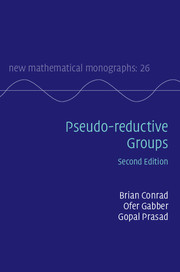Book contents
- Frontmatter
- Dedication
- Contents
- Preface to the second edition
- Introduction
- Terminology, conventions, and notation
- PART I Constructions, examples, and structure theory
- PART II Standard presentations and their applications
- PART III General classification and applications
- 7 The exotic constructions
- 8 Preparations for classification in characteristics 2 and 3
- 9 Absolutely pseudo-simple groups in characteristic 2
- 10 General case
- 11 Applications
- PART IV Appendices
- References
- Index
8 - Preparations for classification in characteristics 2 and 3
from PART III - General classification and applications
Published online by Cambridge University Press: 05 June 2015
- Frontmatter
- Dedication
- Contents
- Preface to the second edition
- Introduction
- Terminology, conventions, and notation
- PART I Constructions, examples, and structure theory
- PART II Standard presentations and their applications
- PART III General classification and applications
- 7 The exotic constructions
- 8 Preparations for classification in characteristics 2 and 3
- 9 Absolutely pseudo-simple groups in characteristic 2
- 10 General case
- 11 Applications
- PART IV Appendices
- References
- Index
Summary
To complete the proof of Theorem 5.1.1 we need to understand the significance of the constructions in Chapter 7, especially the notion of basic exotic pseudo-reductive group that was introduced in Definition 7.2.6 over any imperfect field k of characteristic 2 or 3.
Further properties of basic exotic pseudo-reductive groups
This section lays the groundwork for the definition (in §8.2) of the concept of an exotic pseudo-reductive group over an imperfect field k of characteristic 2 or 3, generalizing the concept of a basic exotic pseudo-reductive group. The real work will be to show that it accounts for all exceptional absolutely pseudosimple groups (in the sense of Definition 6.3.3), at least when is simply connected.
Proposition 8.1.1Let k be an imperfect field of characteristic 2 or 3. A basic exotic pseudo-reductive k-group G is never standard over k.
Proof By Corollary 5.2.3 we may assume k = ks. Let (G′, k′/k,G) be the unique triple giving rise to G as in Proposition 7.2.7. By Corollary 7.2.5(3) the long root groups of G have dimension 1, and by construction the short root groups have dimension > 1 (in fact, [k′ : k]). The pseudo-reductive k-group G is absolutely pseudo-simple (Theorem 7.2.3 and Definition 7.2.6), and an absolutely pseudo-simple standard pseudo-reductive group has all root groups of the same dimension. Hence, G is not standard. □
We wish to apply Proposition 5.1.3 in the context of basic exotic pseudo-reductive groups, as well as their Weil restrictions:
Proposition 8.1.2Let k be an imperfect field of characteristic p ∈ {2, 3}, K a nonzero finite reduced k-algebra, and G a K-group whose fibers are basic exotic pseudo-reductive groups in the sense of Definition 7.2.6.
The k-group RK/k(G) is pseudo-reductive, perfect, and not reductive. Moreover, if Z is a commutative k-group scheme of finite type with no nontrivial smooth connected k-subgroup then any central extension of RK/k(G) by Z over k is split over k.
- Type
- Chapter
- Information
- Pseudo-reductive Groups , pp. 265 - 288Publisher: Cambridge University PressPrint publication year: 2015



